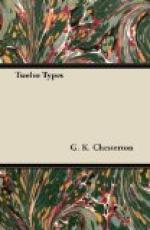The author has most extraordinary ideas about Stevenson’s tales of blood and spoil; he appears to think that they prove Stevenson to have had (we use Mr Baildon’s own phrase) a kind of ‘homicidal mania.’ ’He (Stevenson) arrives pretty much at the paradox that one can hardly be better employed than in taking life.’ Mr Baildon might as well say that Dr Conan Doyle delights in committing inexplicable crimes, that Mr Clark Russell is a notorious pirate, and that Mr Wilkie Collins thought that one could hardly be better employed than in stealing moonstones and falsifying marriage registers. But Mr Baildon is scarcely alone in this error: few people have understood properly the goriness of Stevenson. Stevenson was essentially the robust schoolboy who draws skeletons and gibbets in his Latin grammar. It was not that he took pleasure in death, but that he took pleasure in life, in every muscular and emphatic action of life, even if it were an action that took the life of another.
Let us suppose that one gentleman throws a knife at another gentleman and pins him to the wall. It is scarcely necessary to remark that there are in this transaction two somewhat varying personal points of view. The point of view of the man pinned is the tragic and moral point of view, and this Stevenson showed clearly that he understood in such stories as ‘The Master of Ballantrae’ and ‘Weir of Hermiston.’ But there is another view of the matter—that in which the whole act is an abrupt and brilliant explosion of bodily vitality, like breaking a rock with a blow of a hammer, or just clearing a five-barred gate. This is the standpoint of romance, and it is the soul of ‘Treasure Island’ and ’The Wrecker.’ It was not, indeed, that Stevenson loved men less, but that he loved clubs and pistols more. He had, in truth, in the devouring universalism of his soul, a positive love for inanimate objects such as has not been known since St Francis called the sun brother and the well sister. We feel that he was actually in love with the wooden crutch that Silver sent hurtling in the sunlight, with the box that Billy Bones left at the ‘Admiral Benbow,’ with the knife that Wicks drove through his own hand and the table. There is always in his work a certain clean-cut angularity which makes us remember that he was fond of cutting wood with an axe.
Stevenson’s new biographer, however, cannot make any allowance for this deep-rooted poetry of mere sight and touch. He is always imputing something to Stevenson as a crime which Stevenson really professed as an object. He says of that glorious riot of horror, ‘The Destroying Angel,’ in ‘The Dynamiter,’ that it is ’highly fantastic and putting a strain on our credulity.’ This is rather like describing the travels of Baron Munchausen as ‘unconvincing.’ The whole story of ‘The Dynamiter’ is a kind of humorous nightmare, and even in that story ’The Destroying Angel’ is supposed to be an extravagant lie made up on the spur of the moment. It is




